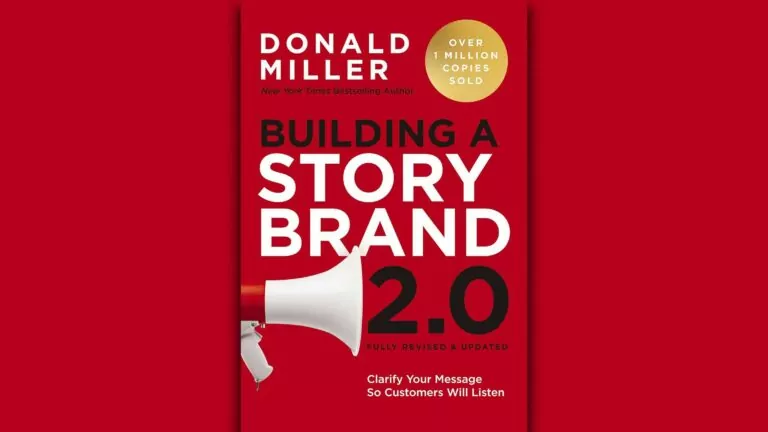Building a Storybrand 2.0
Clarifying your message so customers will listen
by Donald Miller
2025 / 286 pages
I’ve never read a business book that hasn’t challenged or helped me in some way. But business books as a genre are all about big picture thinking and big promises, and they pitch comprehensive new ways of thinking, and even a new way of life.
And as such, there is more than a little religiosity to them.
No, they might not talk about God, but they do talk about reorienting your life’s mission, re-examining your life’s purpose, and better understanding and achieving what success is for you. So if they aren’t talking about God, they should be – He made you to glorify Him, and that’s not some insignificant detail that can be tacked on at the end after you’ve followed up on your latest business book’s strategy for life.
He needs to be the driver of your business life too. And when we start with God, then we can also best evaluate the advice business gurus pitch us. And we can improve on it, taking what lines up with what our Father has revealed to us, and dismissing what doesn’t measure up.
With that in mind, I want to look at Donald Miller’s Building a Storybrand 2.0 chapter by chapter, from an explicitly Christian perspective.
This seems to be one of the business books right now, and there’s lots to love about it. I suspect it could be an incredibly helpful book for Christians in all sorts of industries… including my own.
That’s why I’ll also be applying the principles, as we encounter them, to Reformed Perspective’s “remodel” of our book review section. We’ve got lots of wonderful resources, but our presentation of them is a mostly muddled mess. So how can Storybrand help us help our readers better? My hope is that putting Storybrand into action like this will help show both how this process can help Christian businessmen, and what cautions Christians should bring to this approach.
Introduction
“Customers generally don’t care about your story; they care about their own.”
Donald Miller thinks “your customer should be the hero of the story, not your brand.” There’s something for us to pay attention to here: it’s not about us. Sure, it’s your business, built with your sweat and your money, and spun out of your creativity and passion… but the customer doesn’t even know you, so why would he care?
So is it about just the customer?
To answer that, it’ll help to look at our customers biblically. The Bible tells us to think of the people around us as our neighbors. And we’re to love them as ourselves. And there is one command greater still – we’re to love the Lord our God with all our heart, soul, and mind. So a Christian businessman needs to remember, yes, it’s not about me, but it is also about much more than the customer too. We want to serve our neighbor to glorify our God.
What would that look like for RP books? Right now the section is called “Recommended Reads” and that’s as much about us – here’s what we like – as it is about the visitor.
But if we get both neighbor- and God-focuses, then our messaging becomes a lot clearer. Our books page has always had a deeper purpose, we just weren’t communicating it all that well. These are books that build. If you want to grow as a child of God, if you want to guide your family to resources that will not only entertain but also educate and inspire, then here is a trustworthy source. Children and adults can come here for books that will help them understand the world as it really is – as our Father made it, and sin stained it. Here’s books to chew on – a diet and exercise plan for your mind and spirit.
“Books that build.” Hmmm….a good rebrand?
SECTION 1 – WHY MOST MARKETING IS A MONEY PIT
Chapter 1 – Story is the key to being seen, heard, and understood
“…when we ramble on and on about how we have the biggest manufacturing plant on the West Coast, our customers don’t care. Why? Because that information isn’t helping them eat, drink, find a mate, fall in love, build a tribe, [or] experience a deeper sense of meaning…”
Sometimes testing an idea sense against God’s Word is super simple. Donald Miller says that one of the most effective ways to communicate is by using “the proven power of story.” What does the Bible say about that? It is story. Two thirds of Scripture is narrative. So yes, if God chose to use story to communicate to us, we can agree with Miller that there’s something to it.
But not every story is a good one, so what are some keys to doing it right? Miller thinks our story will need to appeal to the customers’ search for what will help them survive and thrive.
He’s riffing off of “Abraham Maslow’s hierarchy of needs” here, which has evolutionary assumptions undergirding it. Maslow argued that we only start caring about higher things (family, status, even morality) when are more base needs (food, clothing, sleep) have been met. We know from experience that there’s something to that – hard to think of anything but water when you’re on a hike and forgot your canteen – but we’re always called to behave morally, and love our family, etc. so there’s always going to be more to life than surviving.
That said, the takeaway here can be that we need to be speaking to our customers’ thriving, over our own.
The author lists two key mistakes businesses make as they craft the story they want to tell.
- Failing to focus on what will help customers thrive and survive.
- Making it hard for customers to know what we’re saying. Instead of communication, we’re offering noise.
Or, to restate it as action items, our story needs to stress what’s in it for them, quickly and clearly.
Someone landing on RP’s current books page won’t have any idea where to go next or what to click on. And because we haven’t focussed on what we’re trying to say and why that’ll help our visitor, they’re left floundering and confused. And then they leave.
So… story to the rescue?
It doesn’t matter that your business isn’t a novel – Miller is pitching story because, whether we know the formal structure of a story or, we can instinctively predict what’s coming next. We can follow along because we all get stories.
At least the good ones. In a good story
“…audiences must always know who the hero is, what the hero wants, who the hero has to defeat to get what they want, what tragic thing will happen if they don’t win, and what wonderful thing will happen if they do.”
So the key then, is for businessmen to become good story tellers.
Chapter 2 – Story is the secret weapon that will grow your business
“Story is the greatest weapon you have to combat noise because it organizes information in such a way that people are compelled to listen.”
A good story doesn’t have extra bits – we don’t watch Superman sleep, or read about the hobbits taking bathroom breaks. Miller notes Hitchcock as saying a good story is “life with the dull parts taken out.” It doesn’t matter how much an author or scriptwriter might like a bit, if it doesn’t advance the story, it’s going to get cut. So sticking to story structure will help us stay focused on what we really want to say.
So what is that story structure? Miller has divided it into 7 basic plot points
- a HERO wants something but encounters
- a PROBLEM that stops them from getting it
- a GUIDE steps in to help them with
- a PLAN and
- a CALL TO ACTION which helps the hero
- avoid FAILURE and
- achieve SUCCESS
It’s a formula general enough to cover ever hero’s journey you’ve ever read or watched (whether it’s Star Wars, or biblical history like David’s journey to his kingship) but it’s still specific enough to push your business to focus your messaging.
In this chapter Miller also offers up a three question “grunt test.” Your marketing material or website has to equip customers to, in the first five seconds, be able to answer:
- What you offer
- How you’ll make their life better
- What they need to do to buy it
Why is it a “grunt test”? Even a caveman should be able to “look at your website and immediately grunt your offer back to you.”
That’s not happening with the RP book page. Not yet.
Chapter 3 – the simple “SB7” framework
So what is it going to look like, to shape our message as a story? In this chapter Miller takes us through the 7 plot points and puts his Storybrand (SB7) twist on them.
1. A HERO (and it ain’t you)…
One key is to understand that your business is not the hero of your story – that’s the customer (though you may be applying for the guide role). Miller thinks that will be counter-intuitive to many businesses, but for Christians, I think we can see this as a dose of needed and even appreciate humility. It ain’t about us.
But does that mean it has to exclusively be about the customer and what they want? Miller says yes, but I think we need to say no. We know that Jesus is our ultimate hero, and that means, in a very real way, our customer can’t be… at least not ultimately. Does that mean Storybrand is out for us? No, not at all. It just means we are going to have to remember to filter what our customer wants through what God wants. There may well be circumstances where we won’t want to offer what they want, and might want to offer what they don’t want.
By way of example, RP’s book page regularly skips over popular book titles – series that might be super popular among the kids – because we find aspects problematic. We might also recommend some others that we know will never be popular, but which are so good important we’ll still do what we can to promote their readership. Why? Because we’re looking to have God drive, not just our “customers.”
But most of the time, a customer-focused is going to be a good way to keep ourselves asking the right questions. What does our business look like from their perspective? What is it they want?
2. …HAS A PROBLEM…
Miller positions products as “problem-solvers” – food solves our hunger problem, a movie might solve our what-to-do-for-date-night problem, and etc. So businessmen need to understand what problems their customers have that their product can help with.
Miller breaks down customer problems into three categories: external, internal, and philosophical but doesn’t get into the differences… yet.
3. … AND MEETS A GUIDE…
Miller notes that it is human nature to think “the world revolves around [me].” So customers aren’t looking for another hero’ they’ll appreciate guidance but aren’t looking to be rescued.
I wonder if Miller is right on this point. He believes “many politicians have lost their elections because they positioned themselves as the hero instead of the guide.” I’d argue that liberal politicians regularly win elections position themselves as saviors.
But, of course, can still run with his point, because as Christians we aren’t going to want to position ourselves as saviours.












